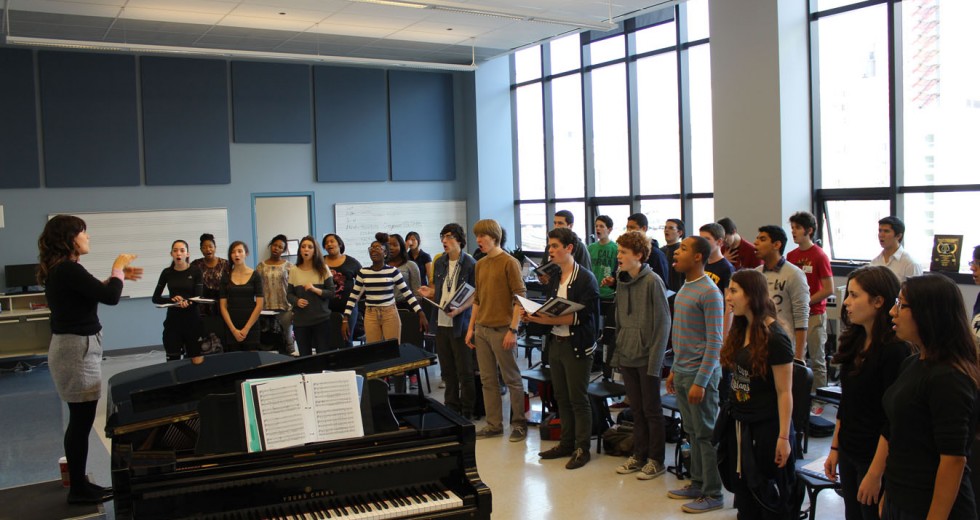
As a part of Music in Our Schools Month, we are featuring a number of music educators and their work in music advocacy. All of them exemplify the values of Citizen Musicianship through their dedicated teaching and as enthusiastic champions for the arts.
Whitney Covalle is the choir director at Jones College Prep in Chicago. Inspired by music from a young age, Covalle uses her own experiences with music to create an environment for her students to thrive and develop as musicians and as people. Also a staunch advocate for the arts, Covalle hopes that her students will be able to receive the benefits of participating in music – and then inform others about the importance of it. To learn more about her program, please visit JonesCollegePrep.org.
How has music shaped your life? What inspired you to seek a career in music education?
For me, music gives me life, and teaching music is life-giving.
I had a very close relationship with my piano teacher. She always pushed me to do more, take on more opportunities, and taught me so much about being a musician — I learned from an early age that music was more than notes on a page. It was about creating beauty in those notes. But it was singing in choir that really gave me joy, and pushed me further musically.
I grew up singing from a young age, and in eighth grade, my choir teacher inspired me and gave me an outlet for expression through choral music. I already played flute and piano, but singing was an entirely different experience — it was communal and team-oriented. In high school I had an incredible choir director who took my choral experience to an entirely new level. He pushed us to explore different genres of music — we did Gershwin and Cole Porter, but also madrigals and classical music. He inspired us through stories, laughter and setting a great example.
While piano was and always will be my first love, I became fully hooked to singing and choral music after participating in choir in school, and I knew that it would be my life’s pursuit.
Can you give a basic overview of your program? How have things changed since you started?
Jones Choir is a Family!
At Jones, we have five choirs – one beginner mixed choir; one advanced level choir called Concert Choir; a chamber choir, comprised of members who audition; a men’s a cappella group, The Y-Chromotones, and a women’s a cappella group. I’ve only been at Jones for two years, but in that time, we’ve grown from 66 members to 90 members. Next year, we’re adding an intermediate level choir, but I’m hoping that our program continues to grow.
The choir members are exposed to and learn diverse music from various genres, vocal styles, composers — I also make sure to have them sing music from different countries and in many different languages. Our world is so much bigger than our country, and I believe that a way to learn more about the world is through music. All of our singers work to be good citizens in choir and the world through practicing tolerance and understanding of their fellow singers and cultures of the world.
What has been your favorite memory in teaching?
There are too many!
Early in my teacher career, I used to teach kindergarten through third grade general music. After a performance, one of my students said, “Can we do that again?!” I love watching kids come alive during performance and watch their confidence grow in themselves and their relationships with each other.
This year at Jones, I’ve challenged my students in the Concert Choir with Bach’s Erschallet, ihr Lieder. They have completely risen to the challenge and I could not be more proud. It’s been incredible to watch them experience this music. I was worried and intimidated as a teacher about my ability to really inspire my students and get them excited about Bach because it felt like such a responsibility, but they have really come alive as they sing it.
My Beginner Choir students also arranged a song on their own! The leadership, creativity and initiative of my students make my work at Jones a true joy. When I can walk away as a teacher, and really be a coach — when they are able to be independent musicians. That is the best part of my job.
How do you advocate for the arts, and music in particular?
I advocate every day. We advocate as teachers for funding, we advocate to parents who may not want their children to take an art class over another core course, we advocate to teaching colleagues who may not see our discipline as a curricular subject, and we advocate to outside audiences who come to our concerts and may want to donate to the choir or support our scholarship program. It is a long list. Advocacy is a part of daily life as an arts educator, and there are many different audiences.
What is the most rewarding aspect of your job?
I love working with my students every day and watching them grow into expressive, artistic musicians. My students always surprise me, make me smile and give me life. Not just with their amazing musicianship — hearing a certain chord come together or seeing them really working together as an ensemble — this is all terrific. But watching them grow as people is my reward.
For me, music education is about building life skills. Maybe 10 percent of them will go on to be professional musicians in some form, and I am OK with that. But I hope all of them go into their lives with skills you gain being involved in a music ensemble: discipline, expression, presenting yourself, practice, memorization, the ability to take critique, responsibility to the group, understanding history and culture in the world, tolerance for others, knowledge about the world, self-confidence and joy in the arts.



